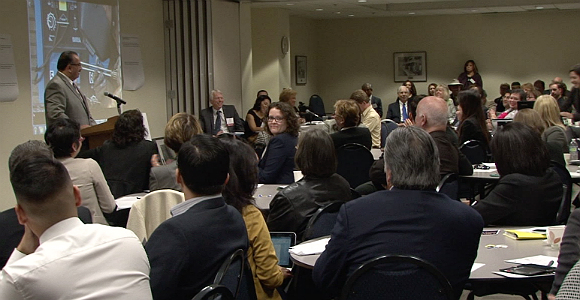
Dr. Francisco Rodriguez, chancellor of the Los Angeles Community College District, adddresses the crowd assembled at the Los Angeles Area Chamber of Commerce for the second Strong Workforce Town Hall. (Photo Credit: John Guenther)
One thing is evident as the California Community Colleges host across the state town halls honing in on building a better workforce: Business is very interested in the topic of workforce development and wants to talk about it.
The latest town hall was held in Los Angeles at the Los Angeles Area Chamber of Commerce on Wednesday. It drew a standing-room crowd, just as the first meeting in Fresno did on February 10. (Here’s our report on that meeting.)
The stakes were set from the opening: California will need a huge cohort of workers with a community college A.A. degree, a certificate or some form of industry valued credentials to fill one million middle-skills jobs.
“The skills gap differs across California which is why these local town halls in five different regions have been conceived,” said Van Ton-Quinlivan, Community College Vice Chancellor for Workforce and Economic Development.
She oversees state and federal funding applied to the career education mission across the system’s 112 community colleges. Her leadership focus is on Doing What Matters for Jobs and the Economy, an effort by the Community Colleges to strength programs to prepare our workers.
The former PG&E executive also reminded the audience why these middle skills job matter and, importantly, how the Community College emphasis on Career Technical Education (CTE) can change lives in California.
“CTE is a path out of poverty. The salary of the average CTE graduate in five years is $66,000,” Ton-Quinlivan, told the Los Angeles audience.
A strong workforce development program will prepare students for high value jobs that already exist in California as well as position California to attract high value jobs from others states and countries.
A panel moderated by Francisco Rodriguez, Chancellor of the Los Angeles Community College District, put additional urgency on the workforce prep problem. “California’s Community Colleges must be more nimble, entrepreneurial and responsive to the 21st century economy,” said Rodriguez.
The audience was asked to identify the most important actions the community colleges need to take to meet the needs of the regional economy. The audience had some very interesting observations.
“Take job descriptions and align those tasks with course offerings to help prepare workers for jobs that are available,” said one.
“The ultimate test of a CTE program is if you can place students in jobs, and the Community Colleges should concentrate more on job placement. Community colleges ought to look more like search firms,” said a retired technology executive.
“Don’t forget manufacturing,” said one aerospace executive. “We need to not only train our workers to the basic skills the job require, but also have to make sure they have critical thinking skills so they can thrive in a work environment.”
One food industry executive added, “We have to talk with them (students) about jobs before they leave high school…and that high schools, community college and regional industry need to work with each other better.”
The reason for the Town Halls was not only to have these interactive discussions but also to arrive at consensus on how the community college system can better act as a catalyst for growth in California’s regional economies.
When the discussion ended, the participants were asked to vote. As their colleagues in Fresno did, the Los Angeles audience identified two main priorities.
1. The Community Colleges need to deepen relationships with employers by sector.
2. There needs to be more work developing work-based learning in partnership with Career Technical Education.
These Town Hall meetings will continue this month as part of the Task Force on Workforce, Job Creation and a Strong Economy created by the Community Colleges’ Board of Governors. The next town hall session will be held in Mountain View (Silicon Valley) on March 10, then move onto Sacramento on March 16 and conclude in San Diego on March 18.
The Task Force next meets on April 2 in Sacramento. Task Force members are knowledgeable leaders from across the community college system, the business community, labor, public agencies involved in workforce training, community based organizations, K-12 policy, and other groups. They will review the input from the Town Hall meetings and begin to consider strategies and recommend policies and practices to the Community Colleges Board of Governors this fall.
The goal of this process is to increase individual and regional economic competitiveness by providing California’s workforce with relevant skills and quality credentials that match employer needs and fuel a strong economy.
First in Fresno and now in Los Angeles, that’s a goal that resonates with the audiences. Expect more of the same as the Town Hall meetings continue.

